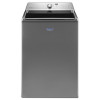Maytag MVWB835DC Installation Guide - Page 16
Venting, Make Gas Connection, U.s.a. And Canada - reviews
 |
View all Maytag MVWB835DC manuals
Add to My Manuals
Save this manual to your list of manuals |
Page 16 highlights
MAKE GAS CONNECTION U.S.A. AND CANADA 1. Connect gas supply to dryer VENTING VENTING REQUIREMENTS Flared male fitting A Non-flared male fitBting Remove red cap from gas pipe. Using a wrench to tighten, connect gas supply to dryer. Use pipe-joint compound on threads of all non-flared male fittings. If flexible metal tubing is used, be sure there are no kinks. NOTE: For LP gas connections, you must use pipe-joint compound resistant to action of LP gas. Do not use TEFLON®† tape. 2. Plan pipe fitting connection D A C B A. 3/8" flexible gas connector C. 3/8" to 3/8" pipe elbow B. 3/8" dryer pipe D. 3/8" pipe-to-flare adapter fitting A combination of pipe fittings must be used to connect dryer to existing gas line. A recommended connection is shown. Your connection may be different, according to supply line type, size, and location. 3. Open shut-off valve Closed valvAe BOpen valve Open shut-off valve in supply line; valve is open when handle is parallel to gas pipe. Then, test all connections by brushing on an approved noncorrosive leak-detection solution. Bubbles will show a leak. Correct any leaks found. WARNING: To reduce the risk of fire, this dryer MUST BE EXHAUSTED OUTDOORS. IMPORTANT: Observe all governing codes and ordinances. Dryer exhaust must not be connected into any gas vent, chimney, wall, ceiling, attic, crawlspace, or a concealed space of a building. Only rigid or flexible metal vent shall be used for exhausting. 4" (102 mm) 4" (102 mm) heavy metal exhaust vent ■■ Only a 4" (102 mm) heavy metal exhaust vent and clamps may be used. ■■ Do not use plastic or metal foil vent. Rigid metal vent: ■■ Recommended for best drying performance and to avoid crushing and kinking. Flexible metal vent: (Acceptable only if accessible to clean) ■■ Must be fully extended and supported in final dryer location. ■■ Remove excess to avoid sagging and kinking that may result in reduced airflow and poor performance. ■■ Do not install in enclosed walls, ceilings, or floors. ■■ The total length should not exceed 73/4 ft. (2.4 m). ■■ The length of flexible metal vent used must be included in the overall vent system design as shown in the "Vent System Charts." NOTE: If using an existing vent system, clean lint from entire length of the system and make sure exhaust hood is not plugged with lint. Replace plastic or metal foil vents with rigid metal or flexible metal vents. Review Vent System Chart and if necessary, modify existing vent system to achieve best drying performance. 16















